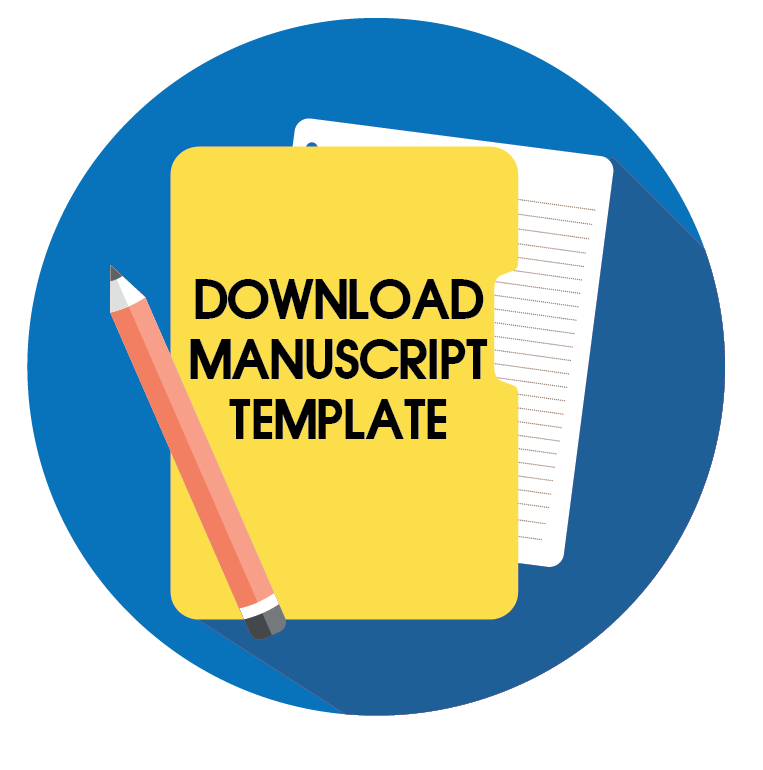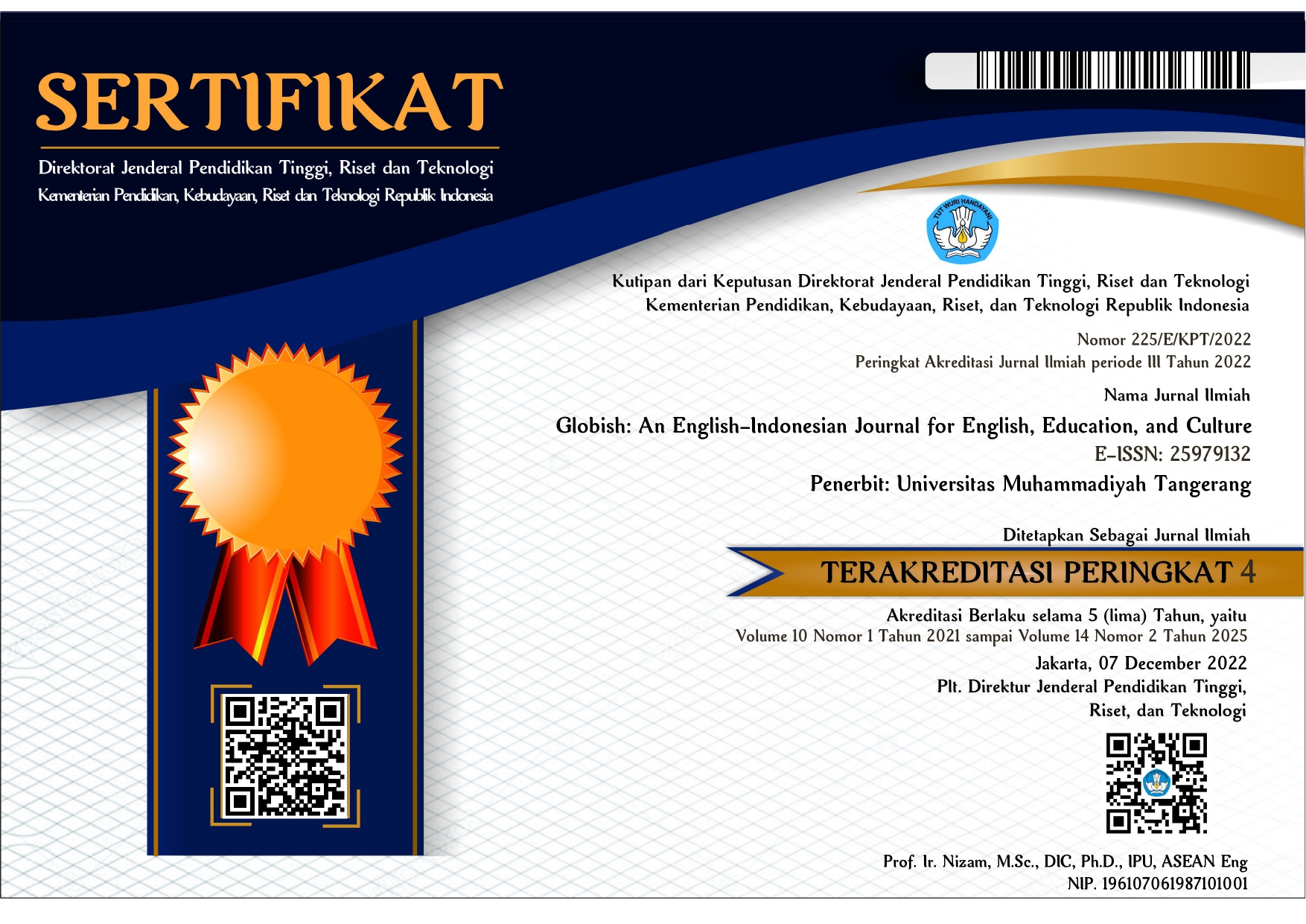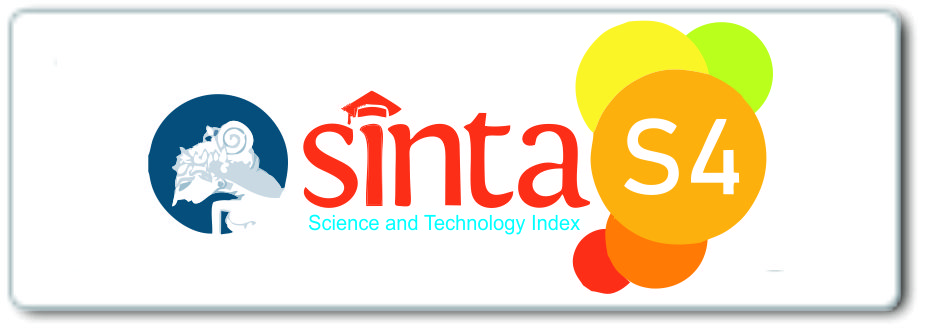STUDENTS’ PERCEPTION ON THE USE OF VLOG AS LEARNING MEDIA FOR EF SPEAKING SKILL
Abstract
The purpose of this study is to find out students’ perceptions toward a learning media for EFL speaking skills. The purpose of this study is to find out students’ perceptions toward a learning media for EFL speaking skills. In this research, the researcher used questionnaires. The method of data analysis was descriptive method, which is analysing the data by illustrating the object of the research. The population of this research was the second-grade students of SMA Lokon St. Nikolaus Tomohon. There were 4 classes that spread into 2 science classes and 2 social classes. There were 107-second year students. And the sample was taken from science and social class based on the teacher’s recommendation. There were 35 students participating in this research to answer the questionnaires. Based on the results of this study, it was found that the students’ perception toward the statements was dominated positively because students were having a great experience in watching Video Blog. As conclusion, YouTube English Vlog was considered effective to the second-year students of SMA Lokon St. Nikolaus Tomohon. English teachers were suggested to always do something creative, follow the technology, and improve what needs to be improved for example blending the media with some interesting stimulations.
Keywords
Full Text:
PDFReferences
Andries, Fivy. (2019). The Use of Drill Techniques in Teaching Present and Past Tense Private Grammar Toward Students in English Study Program of UNIMA. Journal of English Language and Literature, Vol. 4, No. 1, April 2019. http://ejournal.unima.ac.id/index.php/jellt/article/view/944/887
Anne Burns (1997). Teaching speaking: Towards a holistic approach. 25th ETA-ROC Anniversary Conference: Epoch Making in English Language Teaching and Learning
Anggareni, C.W., & Wulanjani, A.N. (2017). The Roles of Ted Talks and Vlog in Speaking Class: Students’ Perspectives. Jurnal Transformasi, Vol. 13, No. 1, 2017: 47 – 52.
Biel, J. & Gatica-Perez, D., Voices of vlogging. (2010). Paper presented at the 4th International AAAI Conference on Weblogs & Social Media, Washington, DC, May 23-26.
Godwin-Jones, R. (2003). Blogs and wikis: Environments for on-line collaboration. Language Learning& Technology, 7(2), 12-16.
Gunelius, S., (2012). Blogging all-in-one for dummies, 2nd Ed, New Jersey: John Wiley & Sons.
Hampp, P. L. (2019). Use of Songs in Teaching Simple To be and Past Tense Teaching. Journal of English Language and Literature Teaching (Vol. 4 No. 1 April 2019), 15.
Javid, Choudhary Zahid. (2015), English for Specific Purposes: Role of Learners, Teachers and Teaching Methodologies. European Scientific Journal, July 2015 edition 11
Lestari, Novita. (2019). Improving the Speaking Skill by Vlog (video blog) as Learning Media: The EFL Students Perspective.
Liando, N. V., Sahetapy, R. J., & Maru, M. G. (2018). English Major Students’ Perceptions Towards Watching English Movies in Listening and Speaking Skills Development. Advances in Social Sciences Research Journal, 5(6).
Liando, N., Maru, M. G., & Merina Kalangi. (2019). The Effect of Applying Internet Browsing in Improving Students’ Reading Comprehension Skill. 2nd International Conference on Social Science.
Luu Trong Tuan. (2012). Teaching and Assessing Speaking Performance through Analytic Scoring Approach. Theory and Practice in Language Studies, Vol. 2, No. 4, pp. 673-679.
Maru, M G. 2009. Engaging Literary Text to Language Exposure for Foreign English Learners.http://cotefl.blogspot.com/2009/05/engaging-literary-textmister-gidion.html. Diakses tanggal 18 Februari 2014.
Maulidah, Izzah. (2017). Vlog: the Mean to Improve Students’ Speaking Ability. Advances in Social Science, Education and Humanities Research, volume 145 International Conference on English Language Teaching (ICONELT 2017)
Molyneaux, H., Gibson, K., O'Donnell, S. & Singer, J. (2008). New visual media & gender: A content, visual & audience analysis of YouTube vlogs. Paper presented at the International Communication Association Annual Conference, Montreal, Quebec, Canada, May 22- 26.
Panambunan, Tulung, & Maru. (2016). Improving Students’ Speaking Ability Through Communicative Language Teaching of the Second Level Students at ‘Mec’ Megalia English Course. Journal of English Language and Literature Teaching, 1 (1) p. 59.
Rao, V. S. P. And Narayana, P. S. (1998), Organisation Theory and Behaviour, (Delhi: Konark Publishing Company), (329-330)
Rakhmanina, Lisa., Kusumaningrum, Dian. (2017). The Effectiveness of Video Blogging in Teaching Speaking Viewed From Students’ Learning Motivation. P-ISSN: 2580-1287 P-ISSN: 2597-6346
Rahman, Z.A., Al-Shboul, M. M., Ahmad, I. S., & Nordin, M. S. (2013). Foreign Language Reading Anxiety in a Jordanian EFL Context: A Qualitative Study. English Language Teaching; Vol. 6, No. 6; 2013.
Safitri, N.S., & Khoiriyah, I. (2017). Students’ Perceptions on the Use of English Vlog (Video Blog) to Enhance Speaking Skill. The 5th Asian Academic Society International Conference. 240-247.
Siska Amelia Maldin, Syailendra Reza Irwansyah Rezeki (2017). Stepping Up the English Speaking Proficiency of Hospitality Students through Video Blogs (Vlogs). Proceedings of the Sixth International Conference on Languages and Arts
Stever, G. S., & Lawson, K. (2013). Twitter as a way for celebrities to communicate with fans: Implications for the study of para-social interaction. North American Journal of Psychology, 15(2), 339–354.
Sun, Yu-Chih., (2009). Voice Blog: An Exploratory Study of Language Learning. Language Learning & Technology. June 2009, Volume 13, No. 2, pp. 88-103
Unumeri, G.O.(2009). Perception and Conflict. Nigeria
Quick, D.L. and Nelson, J.C. (1997), Organisational Behavior: Foundations, Realities, and Challenges, (New York: West Publishing Company), pp. 83-84.
Vigoya, F. S. T. (1997). Testing Accuracy and Fluency in Speaking Through Comunicative Activities. Universidad Gran Colombia.
Vina Nurviyani, Amelia Sri Rahayu (2018). A Study of Students’ Speaking Skill through Vlog. Vol 6
DOI: http://dx.doi.org/10.31000/globish.v11i1.5107
Article Metrics
Abstract - 59102 PDF - 1458Refbacks
- There are currently no refbacks.
Globish
Program Studi Pendidikan Bahasa Inggris
Fakultas Keguruan dan Ilmu Pendidikan
Universitas Muhammadiyah Tangerang
Jl. Perintis Kemerdekaan I/33, Cikokol
Kota Tangerang, Indonesia
e-mail: globish_journal@umt.ac.id
Globish (p-ISSN: 2301-9913 | e-ISSN: 2301-9913) is licensed under a Creative Commons Attribution-ShareAlike 4.0 International License.









